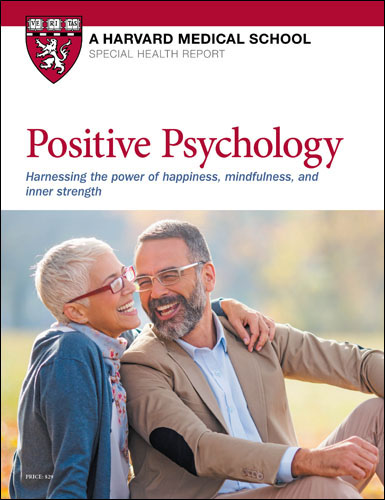Harvard Health Blog
If you are happy and you know it… you may live longer

Plenty of research suggests optimistic people have a reduced risk of heart disease, stroke, and declines in lung capacity and function. Optimism is also associated with a lower risk of early death from cancer and infection. And now a new study links optimism to living a longer life.
What does this new research on optimism tell us?
The study in Proceedings of the National Academy of Sciences found that people who had higher levels of optimism had a longer life span. They also had a greater chance of living past age 85. The researchers analyzed data gleaned from two large population studies: about 70,000 women from the Nurses’ Health Study and about 1,400 men from the Veterans Affairs Normative Aging Study.
The Nurses’ Health Study used items from the Life Orientation Test to assess optimism. The measure asks respondents to rate their level of agreement to several statements about optimism. The Normative Aging Study relied on the Optimism-Pessimism Scale, administered as part of a personality assessment. This scale examines the positive and negative explanations people give for events in their life.
For both men and women, higher levels of optimism were associated with a longer life span and “exceptional longevity,” which the researchers defined as surviving to 85. The study controlled for factors like chronic physical conditions (such as hypertension or high cholesterol) and health behaviors (such as smoking or alcohol use).
There were several limitations to the study results. For example, participants were largely white and had higher socioeconomic status than the general population. These factors may limit whether the findings apply to a wide range of people.
So why might optimism affect longevity? The study wasn’t designed to explain this, but the researchers had several thoughts. While one component of optimism appears to be heritable — that is, tied to our genes — our environment and learning also shape a significant portion. One takeaway is that we can all learn ways to be more optimistic.
How can you become more optimistic?
Whether you’re naturally optimistic or not, you can take certain steps in that direction.
- Reframe situations. When some people confront difficulties, they tend to only view the negative aspects of the situation. Also, they consider these aspects unchangeable. To reframe a difficult situation, search for any positive aspects or silver linings. Is there anything you can learn from the situation? Is there anything you can teach to others about the situation, after you resolve it?
- Set goals. Set achievable goals for each day and adjust those goals as needed. Be specific and realistic. For example, rather than a broad goal, such as “clean house,” identify specific areas that you plan on cleaning (wipe down counters, scrub kitchen sink). Research suggests that setting goals and having the confidence to achieve these goals is related to optimism.
- Set aside time to focus on the positive. At a set time each day (perhaps at bedtime), think about the positive aspects of your day. What went well? What are you happy about? What are you proud of?
- Practice gratitude meditations. Gratitude meditations focus on giving thanks for the positive aspects of your life, which can include family members, friends, or possessions, among other things. You can find numerous scripts and guided meditations available online.
- Strengthen social relationships. The researchers noted that optimism is related to strong social networks. A strong social network can include spending time with close friends, or participating in regularly scheduled group or community activities. Joining new groups or scheduling time to see friends and family and engage in activities strengthens these relationships. Focus on spending time with positive and supportive people.
- Practice the half-smile. A psychotherapy technique to cope with sad feelings is to practice smiling for a few minutes each day. If a full smile is not possible, a half-smile works as well. Notice any impact on your thoughts, mood, and level of optimism.
About the Author

David R. Topor, PhD, MS-HPEd, Contributor
Disclaimer:
As a service to our readers, Harvard Health Publishing provides access to our library of archived content. Please note the date of last review or update on all articles.
No content on this site, regardless of date, should ever be used as a substitute for direct medical advice from your doctor or other qualified clinician.
















